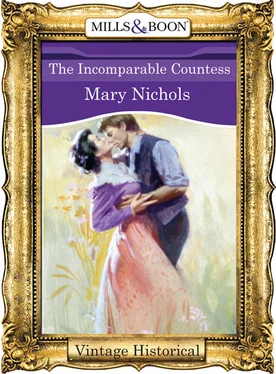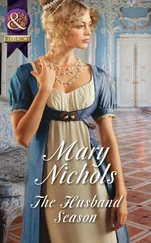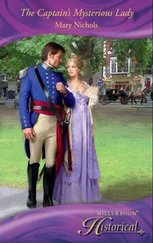‘They are not hidden,’ she said, thinking of those she had painted of him seventeen years before and was glad she had put them on the floor with their faces to the wall. She did not want him to know that she had kept them. ‘Anyone who comes into this room can see them.’
‘But you have not exhibited them?’
‘No, they are not fashionable.’
‘I can readily see that. There is too much stark realism, the brushstrokes are too bold but, in my humble opinion, the execution is top of the trees. I am sure a more discerning public would see their merit at once.’
She laughed. ‘You think someone would like to hang a picture of a dead fox on their drawing-room wall?’
‘No, perhaps not that one. Why did you do it?’
‘The barbarity appalled me.’
Lady Lavinia turned towards her. ‘You think so too, my lady? I hate it. Papa persuaded me to join in the hunt last autumn and, though I enjoyed the ride, it was awful when the dogs caught the fox. They cut off its brush and wiped my face with it. I was dreadfully sick. I’ll never go again.’ It was the longest speech Frances had heard her make.
‘I told you, Vinny,’ the Duke put in with a smile, ‘you only have to be blooded once. It will not happen again.’
‘I am sure that is a great comfort to the fox,’ she retorted. ‘It only has to die once. Well, I tell you this: when I marry, I shall not let my husband hunt.’
He grinned. ‘You think you will have the ordering of your husband, do you? Oh, Vinny, you have a great deal to learn if you believe that.’
‘I shall have it written in the marriage contract or there will be no marriage.’
He laughed aloud, which made the girl colour angrily and Frances decided to intervene. ‘You are evidently very fond of animals, Lady Lavinia.’
‘Yes. I have a menagerie at home at Loscoe Court, but of course I could not bring them with me. Tom, the stable boy, is looking after them for me.’
‘Have you tried to draw them?’
‘No. Why should I? They are there to be seen and touched—why would I want to commit them to paper?’
‘Now, there is an interesting question.’
‘What is?’
‘Why commit anything to paper or canvas? Or plaster and bronze, come to that? Shall we sit down and discuss it? We could do that while I make some preliminary sketches of you.’
‘I would rather be out of doors.’
‘Then let us go into the garden.’ She rose and collected up two sketchbooks and a few pieces of charcoal. Then she turned to Marcus. ‘You may safely leave Lady Lavinia with me, my lord. I am sure you have other calls on your time.’ It was as near a dismissal as she could make without being unpardonably rude. She wanted him to leave; his presence, even when he was not speaking, was unnerving. She needed to be calm and in control, if she were going to teach her pupil anything at all.
He rose and smiled. ‘I will return for her in an hour.’
They went down to the front hall together, where he retrieved his hat, bade Lavinia behave herself, and took his leave.
‘Well, he did not need to say that,’ Lavinia said, peevishly. ‘I am not a child. Anyone would think I was going to demolish the place.’
‘Oh, I do hope not,’ Frances said with a laugh. ‘I have only just got it looking the way I want it.’
Lavinia looked sideways at her and then, realising she was joking, smiled. Her smile, like her father’s, lit her eyes, making Frances wonder why she did not do so more often. There was the promise of great beauty and a telling charm, which should be nurtured. Was that what Marcus had meant about polish? And should she still be thinking of him as Marcus, when that intimacy had long ago vanished and she ought always refer to him, even in her thoughts, as ‘his Grace’ or ‘the Duke’?
‘Come along,’ she said briskly, leading the way through the main hall, past the carved oak staircase and along a corridor to a door which led into a conservatory filled with exotic plants. It was hot and humid and smelled of peat and the heavy perfume of tropical flowers. They passed quickly through it and out into the garden, where the air was dry and balmy. ‘Now, where shall we sit, in the arbour or by the pool?’
Lavinia shrugged. ‘It’s all one to me. I would sooner be sitting a horse.’
Frances laughed. ‘Do you know, so would I.’
‘Then why do this?’ Her arm indicated the drawing equipment.
‘Because we cannot always be doing what we want to do. We all, even you, have obligations, commissions, tasks, whatever you like to call them, which must be seen to before we can think of pleasure. Your papa is paying me to teach you to draw and so I must put my efforts into that. Now, let us make a start.’ She looked about her and pointed to a small wooden structure at the end of the path, which had fretted sides and a steep pitched roof with a cupola on the top. ‘Would you like to draw the pergola?’
‘Oh, very well.’ Lavinia gave a great sigh and took the sketch-book and charcoal Frances held out to her and sat down on a bench beside the pool. She slashed impatiently at the paper, making a line here and another there, a few bold curves and some squiggles and the pergola appeared. Without taking the least trouble over it, she had the line and perspective almost exactly right. ‘There,’ she said handing it back. ‘There is your pergola, my lady.’
Frances bit back the scolding she felt bound to deliver. Lavinia was a spoiled child who thought that being uncooperative might relieve her of doing something she did not want to do. ‘Did you suppose this would persuade me that you are a hopeless case, Lavinia, and that I would tell your father we would not go on with the lessons?’
Lavinia sighed heavily. ‘No, for he is paying you.’
‘That is true, but it is not the only reason we will go on, I assure you,’ she said, trying to sound cheerful and friendly, though she was very tempted to give the child a sharp slap. ‘I am afraid I must disagree with your governess—you are not a hopeless case at all, not when it comes to drawing, at any rate.’
‘How can you tell from that? It is nothing but scribble.’
‘Then pray do something that is not scribble. Add some refinements while I begin my sketch of you.’
Lavinia worked with an ill grace, her face set in a scowl, which Frances transferred to her own sketchbook. Then she turned the page and began on a clean sheet. ‘Lady Lavinia, do you think you could smile, or at least have some pleasant thoughts?’
‘Such as?’
‘Imagine you are out riding, or playing with your pet rabbit.’
‘How do you know I have a rabbit?’
‘Oh, no menagerie would be complete without a rabbit.’
Lavinia laughed and Frances began capturing the image, but she had to work quickly before the girl began to frown again. Both worked in silence for perhaps five minutes before Lavinia flung the pad on the seat beside her and began to roam about the garden. Frances continued to work. ‘I cannot capture your likeness if you do not sit still, Lavinia.’
‘Why not? It seems to me likeness has nothing to do with it. Paint what you think my father would like to see, someone demure and pretty, with hands neatly folded and empty eyes. That is what you do, is it not? Whoever pays the piper calls the tune and so you play it.’
Frances was taken aback, not only by the girl’s outspokenness but by her accuracy, and it made her feel uncomfortable. She was even more discomfited when she realised that Marcus had come into the garden and was leaning against a tree watching them. How long he had been there, she did not know. She shut the sketchbook with a snap and stood up. ‘I think we have had enough for one day, Lavinia,’ she said evenly. ‘Your papa is here to fetch you.’
Читать дальше












